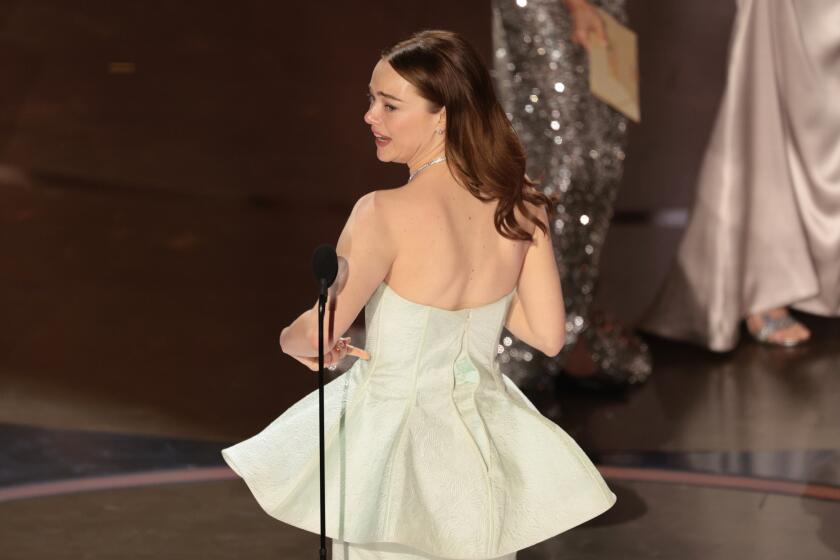Studio is carefully balancing Ledger
How do you run an Oscar campaign for Heath Ledger, the widely admired young actor who died last January of an overdose of prescription drugs?
Very carefully, it seems, as Warner Bros., the studio behind “The Dark Knight,” tries to tread the line between tribute and exploitation in rallying academy support for Ledger’s performance as the maniacal, nihilistic Joker.
Oscar campaigning is serious business in Hollywood, as studios have been known to spend as much as $50 million in a quest for those golden statuettes. The mantra from Warner Bros. sources -- though no one will go on the record -- is that the studio is running a campaign for all members of the filmmaking team and all the actors. The film, which earned almost a billion dollars, was a critical darling.
But consider one Internet ad featuring Ledger in his ghoulish Joker outfit, with a shaded Christian Bale looming in the background in his Batman gear: The ad touts both actors, but it’s clearly the white-faced Ledger whose Joker leer is front and center.
It is a near-consensus in Hollywood that Ledger is a shoo-in for an Oscar nomination for supporting actor and might even win, which would make the forever young Australian the only actor besides “Network’s” Peter Finch to earn an acting Oscar posthumously. Still, he faces strong competition from other contenders, who could include Philip Seymour Hoffman (“Doubt”) and Michael Shannon (for his breakout performance in “Revolutionary Road”).
Already, Academy of Motion Picture Arts and Sciences members say that if Ledger is nominated, his spectral presence could help reverse the ratings slide for the Academy Awards show as fans tune in to see if his riveting turn as the demonic Joker is honored.
Eleven months after Ledger’s death at age 28, still not much is known about his final days or why he had ingested the six drugs the autopsy detected. Ledger apparently suffered from insomnia, and theories were floated through the Internet and the media that his ferocious commitment to the crazed Joker had taken an emotional toll on him. But, for the most part, Hollywood has succeeded with an improbable media blackout, with almost no real information (aside from a few unsourced quotes in tabloids) leaking out about Ledger’s death.
The fascination with the actor has hardly abated, and interest will probably be juiced again when Warner Bros. releases “The Dark Knight” on DVD next week and stages another nationwide theatrical release of the movie Jan. 23 -- the day after the Oscar nominations are announced and the first anniversary of Ledger’s death.
Forbes recently named Ledger the third highest-earning dead celebrity, after Elvis and “Peanuts” creator Charles Schulz, estimating that Ledger’s estate will earn at least $20 million from “The Dark Knight” (his deal included a cut of the film and merchandising revenue).
In Australia, there’s been an ongoing controversy over whether to name a new theater complex in Perth, Ledger’s hometown, after the actor. Ledger’s estate filed suit against the insurance company ReliaStar after the firm stalled on paying the actor’s $10-million life insurance policy while it investigated whether the actor committed suicide. (The New York City medical examiner has ruled his death accidental.)
Warner Bros. was deft in its initial marketing push for “The Dark Knight,” for the campaign neither hid Ledger’s presence nor overly hyped it. (The family asked the studio not to take down any ads using Ledger’s image in the aftermath of his death, according to one studio source.) In fact, word of mouth did most of the work as Ledger’s creepy and brilliant tour de force caught the public’s imagination. It’s impossible to know how much his untimely death added to the studio’s bottom line.
Running an Oscar campaign is even trickier, though, because there are more pointed questions of taste and propriety. Last summer, Terry Gilliam, Ledger’s friend and the director of his final film, “The Imaginarium of Dr. Parnassus,” complained to the Telegraph of London that such a campaign was inherently exploitative.
“They’ll do anything to publicize their film,” Gilliam said of the studio. “That’s just what they do, and you can’t get upset. . . . They’re like a great white shark which devours whatever it can.”
An Oscar consultant who represents other competitors and who declined to be named because of the sensitive nature of the Ledger situation said: “There is sadness to the situation, but you don’t use it. It just exists.”
One challenge to a full-fledged award campaign is Ledger’s absence. Doing the screening-party circuit is usually a must for any would-be nominee, notes another competing Oscar strategist who also asked for anonymity: “One of the biggest challenges is, obviously, not having Heath. You don’t have the person to be the face of the campaign.”
This week, the studio threw a de rigueur Oscar fete at a swank Italian restaurant in Beverly Hills. Chocolate-covered strawberries and plates of fusilli swirled by as stars Christian Bale and Aaron Eckhart and director Christopher Nolan chatted with the crowd of journalists. “I miss Heath,” said producer Charles Roven before telling a funny story about Ledger accessorizing his nurse outfit -- one of the Joker’s disguises -- with a Harvey Dent campaign sticker he’d gotten from the film’s Internet campaign. “He was such a fearless actor.”
When the film was released in July, Nolan, various actors and Roven attended special question-and-answer sessions for the Screen Actors Guild, the Directors Guild of America and the Producers Guild of America. The studio is already conducting special academy screenings in regular format and Imax, and has offered to send the academy and guild members their screening copies in Blu-Ray if they prefer.
Still, the topic of Ledger is a sensitive one for Warner Bros., which refused to comment for this article. A publicist for Nolan said that he too would be unavailable.
But working in Ledger’s favor is the fact that the academy is familiar with his work, having nominated him for 2005’s “Brokeback Mountain.”
One of “The Dark Knight’s” primary Oscar rivals is “Slumdog Millionaire,” a film that Warner Bros. initially bought the domestic rights for. After the conglomerate closed its art-house division Warner Independent Pictures last summer, it opted to split the rights with Fox Searchlight, which is now marketing and distributing the film. The $15-million Hindi-English movie tells the story of a slum kid from Mumbai who improbably ends up on the Indian version of the game show “Who Wants to Be a Millionaire.” “Slumdog Millionaire” has already begun to sweep the various critics’ awards and appears destined for nominations, possibly including one for star Dev Patel, who would be a rival of Ledger in the supporting actor category.
As for “The Dark Knight’s” Oscar prospects, rivals tend to be dismissive of Warner Bros.’ hopes to turn it into the first Oscar-winning comic-book movie, in part because the demographic makeup of the 5,800-member academy skews older -- not the traditional superhero fan base. Said one, who also declined to be named given the contentiousness of the off-screen jockeying: “Until we wake up one day and we no longer are making any good movies -- dramas -- then the academy will not go this route, unless it’s outrageously different . . . . This picture is not so different from the first one. It’s still the Batman story. He wears a hat with ears, a cape that can fly.”
It’s hard to imagine Oscar nominations adding even more lucre to “The Dark Knight’s” box-office bonanza. The entity that would probably benefit the most from some Ledger fairy dust is the academy itself.
History has shown that Oscar TV viewership is related to the popularity of the nominees, reaching a high of 55.3 million viewers in 1998 when “Titanic” swept the awards. Last year was the smallest audience in Oscar history, with only 32 million viewers tuning in to watch the arty “No Country for Old Men” win top honors. This year, the academy is making a push to broaden the show’s appeal by showing snippets of box-office hits during the broadcast, whether nominated or not.
The academy also ended the ban on commercials for upcoming movies, with the hope of creating a Super Bowl-type climate in which splashy ads generate almost as much buzz as the show.
Over the years, a number of actors have been nominated after death, among them Spencer Tracy, Ralph Richardson and James Dean, who was recognized for both “East of Eden” and “Giant.” The last actor to be nominated for a posthumous Oscar was Massimo Troisi, who died after the filming of “Il Postino” in 1994. Yet the campaign was different, because Troisi, who had specifically delayed a heart operation in order to complete the film, was unknown to U.S. audiences. “A key part of the publicity campaign was introducing American audiences to Massimo,” recalls 42West publicist Cynthia Swartz, who worked on the campaign. “Everything we did was a celebration of what he accomplished.”
Clearly, celebration will also be the leitmotif of the Batman filmmakers as they invariably field questions about Ledger during Oscar season. When asked about a possible Oscar for Ledger, director Nolan recently told The Times’ Geoff Boucher: “The thing that has always been important to me in light of Heath’s death is the responsibility I’ve felt to his work. . . . It’s easy to forget, with everything that has happened, what an enormous challenge it was for Heath to take on this iconic role. He rose to that challenge so admirably that any expression of people being moved or excited by his performance is a wonderful thing.”
--
rachel.abramowitz@ latimes.com
More to Read
The biggest entertainment stories
Get our big stories about Hollywood, film, television, music, arts, culture and more right in your inbox as soon as they publish.
You may occasionally receive promotional content from the Los Angeles Times.






